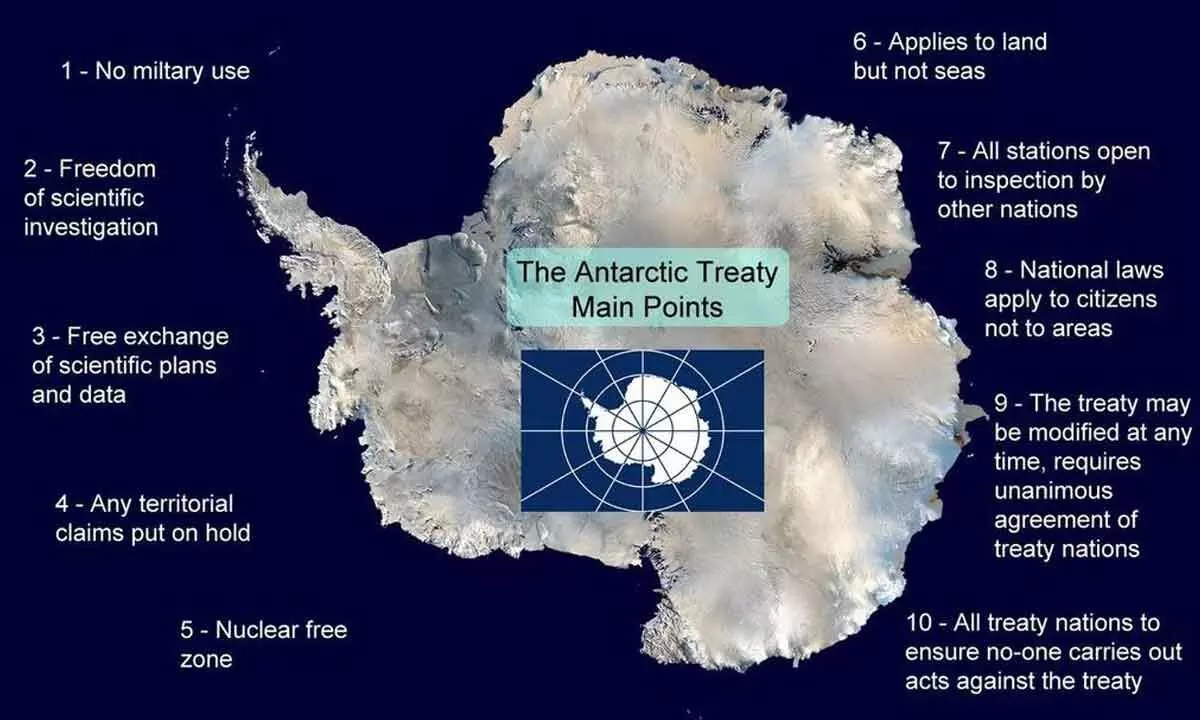Key meet on Antarctic Treaty in May
Share :

India set up first Antarctic research station, Dakshin Gangotri, in 1983
The Ministry of Earth Sciences, through the National Centre for Polar and Ocean Research, will host the 46th Antarctic Treaty Consultative Meeting (ATCM 46) and the 26th Meeting of the Committee for Environmental Protection (CEP 26) from May 20 to 30 at Kochi in Kerala.
“The hosting of the 46th ATCM and 26th CEP meeting reflects India’s growing role as a responsible global stakeholder in efforts to preserve Antarctica for future generations. Through open dialogue, collaboration, and consensus-building, India remains committed to upholding the principles of the Antarctic Treaty and contributing to the sustainable management of one of Earth’s last pristine wilderness areas,” said M Ravichandran, Secretary of the Ministry of Earth Sciences.
According to British Antarctic Survey, twelve countries represented by the Governments of Argentina, Australia, Belgium, Chile, the French Republic, Japan, New Zealand, Norway, the Union of South Africa, the Union of Soviet Socialist Republics, the United Kingdom of Great Britain and Northern Ireland, and the United States of America, signed the Antarctic Treaty on 1 December 1959 in Washington. Antarctica shall be used for peaceful purposes only and the continuance of international harmony in Antarctica will further the purposes and principles embodied in the Charter of the United Nations. Recently Iran’s Navy Commander, Rear Admiral Shahram Irani’s claims of ownership over Antarctica cast a shadow over the South Pole continent’s exclusivity and world security. “We have plans to raise our flag there and carry out military and scientific work”, declared the Iranian commander.
The key items on the 46th ATCM agenda include strategic planning for sustainable management of Antarctica and its resources; policy, legal, and institutional operations; biodiversity prospecting; inspections and exchange of information and data; research, collaboration, capacity building and cooperation; addressing climate change impacts; development of tourism framework; and promoting awareness.
The 26th CEP agenda focuses on Antarctic environment evaluation, impact assessment, management, and reporting; climate change response; area protection and management plans including marine spatial protection; and conservation of Antarctic biodiversity. Over 350 delegates from more than 60 countries are expected to attend the ATCM and CEP meetings which are pivotal in the international community’s ongoing efforts to safeguard Antarctica’s fragile ecosystem and promote scientific research in the region.
Convened annually under the Antarctic Treaty System, these meetings serve as forums for Antarctic Treaty Consultative Parties and other stakeholders to address Antarctica’s pressing environmental, scientific, and governance issues. The Antarctic Treaty, signed in 1959 and entered into force in 1961, established Antarctica as a region dedicated to peaceful purposes, scientific cooperation, and environmental protection. Over the years, the Treaty has garnered widespread support, with 56 countries currently party to it.
India has been a Consultative Party to the Antarctic Treaty since 1983. It participates in the decision-making process along with the other 28 Consultative Parties to the Antarctic Treaty. India’s first Antarctic research station, Dakshin Gangotri, was established in 1983. At present, India operates two year-round research stations: Maitri (1989) and Bharati (2012). The permanent research stations facilitate Indian Scientific Expeditions to Antarctica, which have been ongoing annually since 1981.
In 2022, India enacted the Antarctic Act, reaffirming its commitment to the Antarctic Treaty. India’s scientific and strategic endeavours in the polar regions (the Arctic and Antarctic), the Himalayas, and the Southern Ocean are under the National Centre for Polar and Ocean Research (NCPOR) in Goa.







